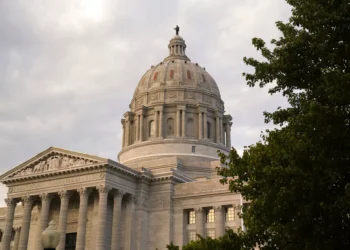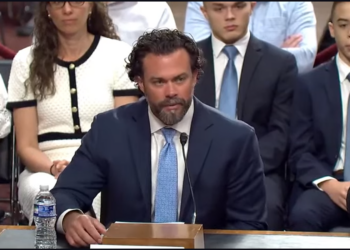Sen. Mike Lee, R-Utah, will introduce on Thursday a short two-page bill designed to — as the legislation’s preamble explains — “restore executive power to appoint United States attorneys.” The move comes following two high-profile fights between the Department of Justice and federal courts that refused to acquiesce in the president’s pick for U.S. attorney.
U.S. attorneys hold authority to enforce the law on behalf of the executive branch within 94 judicial districts throughout the United States. U.S. attorneys are political appointees, selected by the president to ensure those charged with enforcing the law follow his policy priorities, but they are subject to the advice and consent of the Senate. So, unless and until the Senate confirms the president’s choice, the U.S. attorney position remains vacant.
To account for this delay, Congress authorized the attorney general to appoint, for up to 120 days, an interim U.S. attorney. That same statute provides that if the presidential appointee is not confirmed within that 120-day period, “the district court for such district may appoint a United States attorney to serve until the vacancy is filled.”
The Senate’s delay in considering Trump’s U.S. attorney nominations has caused the 120-day clock to run out on some acting U.S. attorney appointments. Under the current legislation, then, the district courts hold authority to name a new acting U.S. attorney. And while the courts could name the same person selected by the Trump Administration, we’ve seen two recent cases where the judges have refused to do so.
For instance, in the Northern District of New York, which is based in Albany, Attorney General Pam Bondi appointed John A. Sarcone III to serve as the interim U.S. attorney. However, after the 120-day statutory period expired, the district court declined to name Sarcone to continue in that role.
Attorney General Bondi sidestepped the district court by branding Sarcone the “first assistant” to the U.S. attorney, which then allowed the president to name Sarcone acting U.S. attorney pursuant to another federal statute, the Federal Vacancies Reform Act of 1998.
The clock also expired on the lawyer Bondi named U.S. attorney in New Jersey, Alina Habba. At that point, the New Jersey District Court named Habba’s first assistant, Desiree Lee Grace, acting U.S. attorney. Soon after, the attorney general announced that Grace had been removed from that position, posting on X: “This Department of Justice does not tolerate rogue judges — especially when they threaten the President’s core Article II powers.” Trump and Bondi then followed the same work-around with Habba, initially naming her the first assistant and then the acting U.S. attorney under the Federal Vacancies Reform Act of 1998.
There should be no reason for these games, however, as courts have no legitimate business deciding for the executive branch who should serve as the top law enforcement officer in the district. That the district courts have long held the authority by statute and have previously avoided conflicts is irrelevant, for there is a clear conflict now. And when it comes to deciding who should represent the executive branch as a U.S. attorney, separation of powers means the president must prevail over the judicial branch.
Sen. Lee’s proposed legislation recognizes that reality and provides a direct solution that avoids the machinations currently required, with the bill removing the statutory provision that directs the district courts to name an acting U.S. attorney. The draft bill replaces that provision with language authorizing a U.S. attorney appointed by the attorney general to serve until the individual appointed by the president is confirmed by the Senate.
The Utah senator told The Federalist that “President Trump deserves to pick the people working for him.” Lee added that Congress had previously removed the provision allowing district courts to name acting U.S. attorneys, but then “Democrats revived it to hamper the Bush administration almost 20 years ago.”
“It’s time we restored this prerogative to the leader of the executive branch,” Lee stressed.
He’s right, but whether the closely divided Congress will agree remains to be seen. In the meantime, however, President Trump has already gamed a way around the judicial overreach — at least when it comes to his U.S. attorneys. He continues to face an ongoing coup by court on nearly every other front, from immigration, to the Big Beautiful Bill’s defunding of Big Abortion, to the priorities executive agencies will fund.
Margot Cleveland is an investigative journalist and legal analyst and serves as The Federalist’s senior legal correspondent. Margot’s work has been published at The Wall Street Journal, The American Spectator, the New Criterion, National Review Online, Townhall.com, the Daily Signal, USA Today, and the Detroit Free Press.
She is also a regular guest on nationally syndicated radio programs and on Fox News, Fox Business, and Newsmax. Cleveland is a lawyer and a graduate of the Notre Dame Law School, where she earned the Hoynes Prize—the law school’s highest honor. She later served for nearly 25 years as a permanent law clerk for a federal appellate judge on the Seventh Circuit Court of Appeals.
Cleveland is a former full-time university faculty member and now teaches as an adjunct from time to time. Cleveland is also of counsel for the New Civil Liberties Alliance.
Cleveland is on Twitter at @ProfMJCleveland where you can read more about her greatest accomplishments—her dear husband and dear son. The views expressed here are those of Cleveland in her private capacity.
















